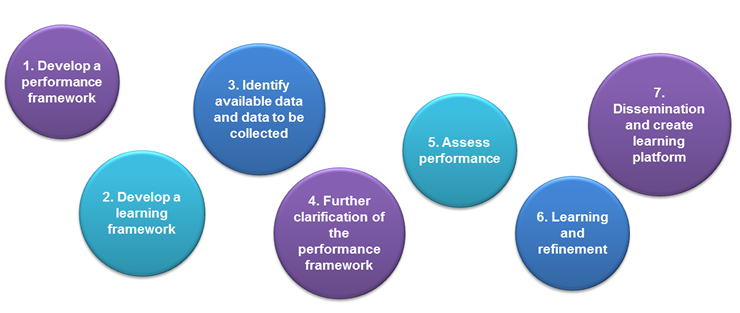PRODUCTS
The products from the evaluation map to the key evaluation steps involved closely. As developed, the products will be shared on this site.
Key steps in the evaluation (click on the key steps for further information and products)

1. Develop a performance framework
- Clarify what TC was trying to achieve and HOW it was planning to impact outcomes
- Develop a theory of change for TC (A Theory of Change will link the initiative activities to short and long term outcomes)
- Refine and develop an initial theory of change
- Clarify what high performance means in relationship to the theory of change
- Clarify uncertainties in the TC theory of change
Products and When
- A theory of change report that will include a section on the learning framework;
- Theory of change on the website will also be updated
- To be completed by end of July 2012
2. Develop a learning framework
Identify the types of learning that are of interest to the stakeholders:
- Organizational
- Impacts
- Process
- Landscape of global health
Develop a clear prioritization of the learning questions
Products and When
- A theory of change report that will include a section on the learning framework;
- Theory of change on the website will also be updated
- To be completed by end of July 2012
3. Identify available data and data to be collected
- Match data elements to the questions
Products and When
- A four-page data summary that connects the evaluation questions to the data
- End of August 2012
4. Further clarification of the performance framework
- Develop an anticipated timeline of impact
- Refine theory of change for TC with clear performance markers
Products and When
- Report analyzing correspondence between interim and final reports
- Early October 2012
5. Assess performance
- Map the bibliometric data and other monitoring data to the theory of change
- Explore if the observed performance matches the expected performance
Products and When
- Interim Report will describe the impacts of the TC funding on early outcomes and also lessons for improvement
- Early November 2012
6. Learning and refinement
- Identify implementation challenges
- Map back data from programs to the learning framework
- Align learning with decisions that have already been taken about phase 2 of TC
Products and When
7. Dissemination and create learning platform
- Implement carefully planned dissemination strategy
- Produce learning/ knowledge nuggets
- Produce 2-3 brief interim reports/final report
Develop website as a good model of learning and tool to promote dialogue
Products and When
- Final Report: End of December 2012
- Dissemination is ongoing
|